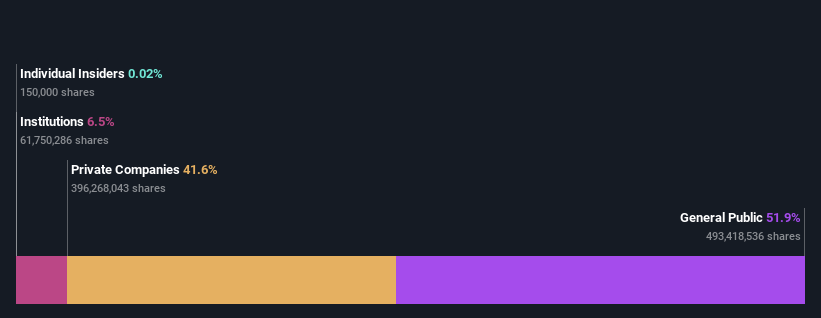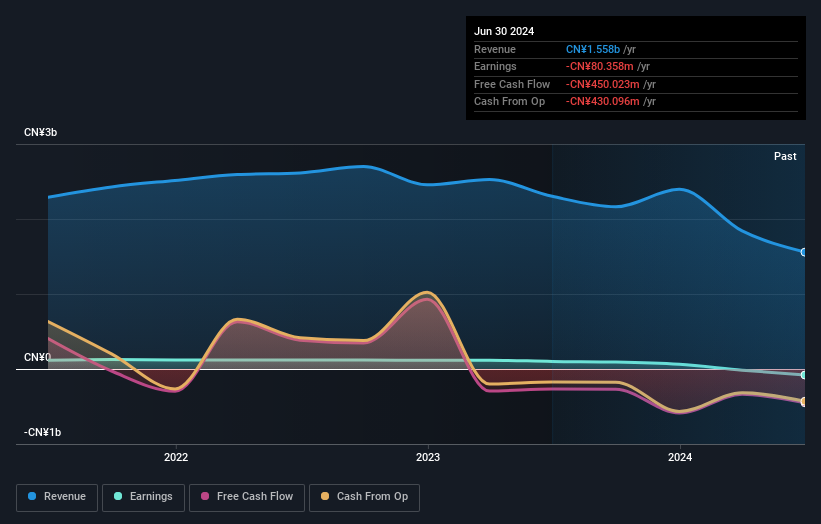- China
- /
- Real Estate
- /
- SHSE:600773
Individual investors are Tibet Urban Development and Investment Co.,LTD's (SHSE:600773) biggest owners and were rewarded after market cap rose by CN¥495m last week

Key Insights
- Significant control over Tibet Urban Development and InvestmentLTD by individual investors implies that the general public has more power to influence management and governance-related decisions
- 48% of the business is held by the top 25 shareholders
- Using data from company's past performance alongside ownership research, one can better assess the future performance of a company
A look at the shareholders of Tibet Urban Development and Investment Co.,LTD (SHSE:600773) can tell us which group is most powerful. And the group that holds the biggest piece of the pie are individual investors with 52% ownership. Put another way, the group faces the maximum upside potential (or downside risk).
As a result, individual investors collectively scored the highest last week as the company hit CN¥11b market cap following a 4.7% gain in the stock.
Let's delve deeper into each type of owner of Tibet Urban Development and InvestmentLTD, beginning with the chart below.
View our latest analysis for Tibet Urban Development and InvestmentLTD

What Does The Institutional Ownership Tell Us About Tibet Urban Development and InvestmentLTD?
Institutions typically measure themselves against a benchmark when reporting to their own investors, so they often become more enthusiastic about a stock once it's included in a major index. We would expect most companies to have some institutions on the register, especially if they are growing.
As you can see, institutional investors have a fair amount of stake in Tibet Urban Development and InvestmentLTD. This implies the analysts working for those institutions have looked at the stock and they like it. But just like anyone else, they could be wrong. When multiple institutions own a stock, there's always a risk that they are in a 'crowded trade'. When such a trade goes wrong, multiple parties may compete to sell stock fast. This risk is higher in a company without a history of growth. You can see Tibet Urban Development and InvestmentLTD's historic earnings and revenue below, but keep in mind there's always more to the story.

Tibet Urban Development and InvestmentLTD is not owned by hedge funds. Shanghai North Enterprise (Group) Co.,Ltd. is currently the largest shareholder, with 41% of shares outstanding. With 1.2% and 0.9% of the shares outstanding respectively, First State Cinda Fund Management Company Limited and Jiangsu Taozhugong Private Fund Management Co., Ltd. are the second and third largest shareholders.
Our studies suggest that the top 25 shareholders collectively control less than half of the company's shares, meaning that the company's shares are widely disseminated and there is no dominant shareholder.
While studying institutional ownership for a company can add value to your research, it is also a good practice to research analyst recommendations to get a deeper understand of a stock's expected performance. Our information suggests that there isn't any analyst coverage of the stock, so it is probably little known.
Insider Ownership Of Tibet Urban Development and InvestmentLTD
While the precise definition of an insider can be subjective, almost everyone considers board members to be insiders. Management ultimately answers to the board. However, it is not uncommon for managers to be executive board members, especially if they are a founder or the CEO.
I generally consider insider ownership to be a good thing. However, on some occasions it makes it more difficult for other shareholders to hold the board accountable for decisions.
Our data suggests that insiders own under 1% of Tibet Urban Development and Investment Co.,LTD in their own names. But they may have an indirect interest through a corporate structure that we haven't picked up on. It's a big company, so even a small proportional interest can create alignment between the board and shareholders. In this case insiders own CN¥1.7m worth of shares. It is always good to see at least some insider ownership, but it might be worth checking if those insiders have been selling.
General Public Ownership
The general public -- including retail investors -- own 52% of Tibet Urban Development and InvestmentLTD. This size of ownership gives investors from the general public some collective power. They can and probably do influence decisions on executive compensation, dividend policies and proposed business acquisitions.
Private Company Ownership
We can see that Private Companies own 42%, of the shares on issue. Private companies may be related parties. Sometimes insiders have an interest in a public company through a holding in a private company, rather than in their own capacity as an individual. While it's hard to draw any broad stroke conclusions, it is worth noting as an area for further research.
Next Steps:
While it is well worth considering the different groups that own a company, there are other factors that are even more important. Like risks, for instance. Every company has them, and we've spotted 3 warning signs for Tibet Urban Development and InvestmentLTD (of which 2 are a bit concerning!) you should know about.
Of course, you might find a fantastic investment by looking elsewhere. So take a peek at this free list of interesting companies.
NB: Figures in this article are calculated using data from the last twelve months, which refer to the 12-month period ending on the last date of the month the financial statement is dated. This may not be consistent with full year annual report figures.
Valuation is complex, but we're here to simplify it.
Discover if Tibet Urban Development and InvestmentLTD might be undervalued or overvalued with our detailed analysis, featuring fair value estimates, potential risks, dividends, insider trades, and its financial condition.
Access Free AnalysisHave feedback on this article? Concerned about the content? Get in touch with us directly. Alternatively, email editorial-team (at) simplywallst.com.
This article by Simply Wall St is general in nature. We provide commentary based on historical data and analyst forecasts only using an unbiased methodology and our articles are not intended to be financial advice. It does not constitute a recommendation to buy or sell any stock, and does not take account of your objectives, or your financial situation. We aim to bring you long-term focused analysis driven by fundamental data. Note that our analysis may not factor in the latest price-sensitive company announcements or qualitative material. Simply Wall St has no position in any stocks mentioned.
About SHSE:600773
Tibet Urban Development and InvestmentLTD
Develops, operates, manages, and sells real estate properties in China.
Mediocre balance sheet low.


